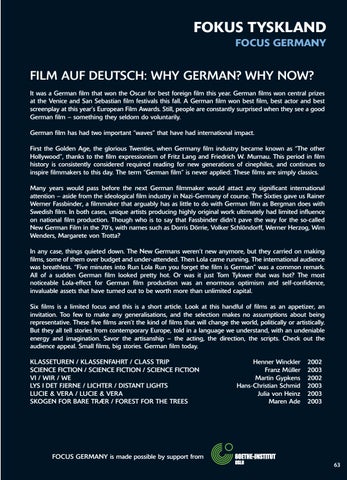FilmfestINNMAT_katalog_rev
29.12.03
16:31
Side 63
FOKUS TYSKLAND FOCUS GERMANY
FILM AUF DEUTSCH: WHY GERMAN? WHY NOW? It was a German film that won the Oscar for best foreign film this year. German films won central prizes at the Venice and San Sebastian film festivals this fall. A German film won best film, best actor and best screenplay at this year’s European Film Awards. Still, people are constantly surprised when they see a good German film – something they seldom do voluntarily. German film has had two important “waves” that have had international impact. First the Golden Age, the glorious Twenties, when Germany film industry became known as “The other Hollywood”, thanks to the film expressionism of Fritz Lang and Friedrich W. Murnau. This period in film history is consistently considered required reading for new generations of cinephiles, and continues to inspire filmmakers to this day. The term “German film” is never applied: These films are simply classics. Many years would pass before the next German filmmaker would attact any significant international attention – aside from the ideological film industry in Nazi-Germany of course. The Sixties gave us Rainer Werner Fassbinder, a filmmaker that arguably has as little to do with German film as Bergman does with Swedish film. In both cases, unique artists producing highly original work ultimately had limited influence on national film production. Though who is to say that Fassbinder didn’t pave the way for the so-called New German Film in the 70’s, with names such as Dorris Dörrie, Volker Schlöndorff, Werner Herzog, Wim Wenders, Margarete von Trotta? In any case, things quieted down. The New Germans weren’t new anymore, but they carried on making films, some of them over budget and under-attended. Then Lola came running. The international audience was breathless. “Five minutes into Run Lola Run you forget the film is German” was a common remark. All of a sudden German film looked pretty hot. Or was it just Tom Tykwer that was hot? The most noticeable Lola-effect for German film production was an enormous optimism and self-confidence, invaluable assets that have turned out to be worth more than unlimited capital. Six films is a limited focus and this is a short article. Look at this handful of films as an appetizer, an invitation. Too few to make any generalisations, and the selection makes no assumptions about being representative. These five films aren’t the kind of films that will change the world, politically or artistically. But they all tell stories from contemporary Europe, told in a language we understand, with an undeniable energy and imagination. Savor the artisanship – the acting, the direction, the scripts. Check out the audience appeal. Small films, big stories. German film today. KLASSETUREN / KLASSENFAHRT / CLASS TRIP SCIENCE FICTION / SCIENCE FICTION / SCIENCE FICTION VI / WIR / WE LYS I DET FJERNE / LICHTER / DISTANT LIGHTS LUCIE & VERA / LUCIE & VERA SKOGEN FOR BARE TRÆR / FOREST FOR THE TREES
Henner Winckler Franz Müller Martin Gypkens Hans-Christian Schmid Julia von Heinz Maren Ade
2002 2003 2002 2003 2003 2003
FOCUS GERMANY is made possible by support from 63







